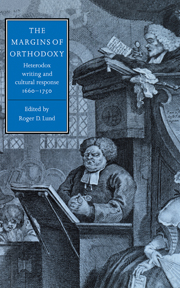Book contents
- Frontmatter
- Contents
- List of contributors
- Acknowledgments
- Introduction
- PART I THE IDEOLOGY AND ORIGINS OF HETERODOXY
- PART II LOCKE AND HETERODOX OPINION
- PART III POLICING THE MARGINS
- 5 Samuel Parker, religious diversity, and the ideology of persecution
- 6 The Societies for the Reformation of Manners: between John Locke and the devil in Augustan England
- 7 Irony as subversion: Thomas Woolston and the crime of wit
- 8 The limits of moderation in a Latitudinarian parson: or, High Church zeal in a low churchman discovere'd
- PART IV ORTHODOX DEFENSES, HETERODOX RESULTS
- Select bibliography
- Index
6 - The Societies for the Reformation of Manners: between John Locke and the devil in Augustan England
Published online by Cambridge University Press: 09 October 2009
- Frontmatter
- Contents
- List of contributors
- Acknowledgments
- Introduction
- PART I THE IDEOLOGY AND ORIGINS OF HETERODOXY
- PART II LOCKE AND HETERODOX OPINION
- PART III POLICING THE MARGINS
- 5 Samuel Parker, religious diversity, and the ideology of persecution
- 6 The Societies for the Reformation of Manners: between John Locke and the devil in Augustan England
- 7 Irony as subversion: Thomas Woolston and the crime of wit
- 8 The limits of moderation in a Latitudinarian parson: or, High Church zeal in a low churchman discovere'd
- PART IV ORTHODOX DEFENSES, HETERODOX RESULTS
- Select bibliography
- Index
Summary
Over the past several decades historians of political thought have offered quite contrasting accounts of the persistence in eighteenth-century England of an ancien régime in church and state, especially as regards the extent and strength of religious orthodoxy. In the 1960s and seventies, most historians placed England's decisive break with ancien régime in the events following upon the Glorious Revolution. The repudiation of divine right ideology and the extension of tolerance to Dissenters suggested the demise of the “confessional state,” both constitutionally and ideologically. Isaac Kramnick's early work Bolingbroke and His Circle is typical of this tendency. The authors he discusses inhabit a largely secular world and are more concerned with matters of finance than of religion. His subtitle, The Politics of Nostalgia in the Age of Walpole, implies the conclusion that those defending the old order had already been passed by.
The Pocockian moment in historical scholarship reinforced and extended this view of an ancien régime come to grief earlier rather than later in the century's span. Court and country spoke the same language of civic humanism; while those of either party who sought alternative conceptual resources with which to make sense of the postrevolutionary polity turned to an equally secular language of manners and politeness. Religious self-understandings, while occasionally acknowledged, were accorded little enduring significance. During the 1980s a number of revisionist histories have challenged this historical consensus, emphasizing among other things the vitality of both religious and High Tory (even Jacobite) conceptions of political order long past the consolidation of William and Mary's rule.
- Type
- Chapter
- Information
- The Margins of OrthodoxyHeterodox Writing and Cultural Response, 1660–1750, pp. 149 - 169Publisher: Cambridge University PressPrint publication year: 1995
- 2
- Cited by



